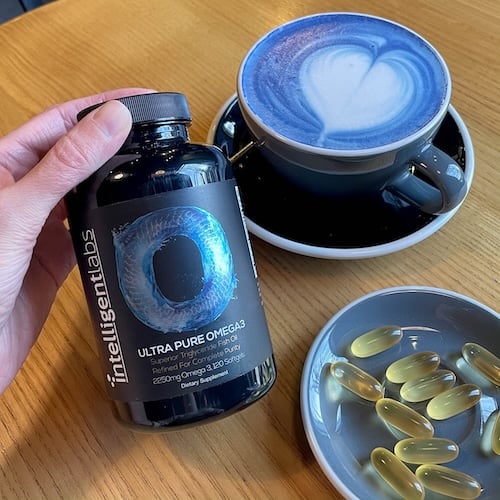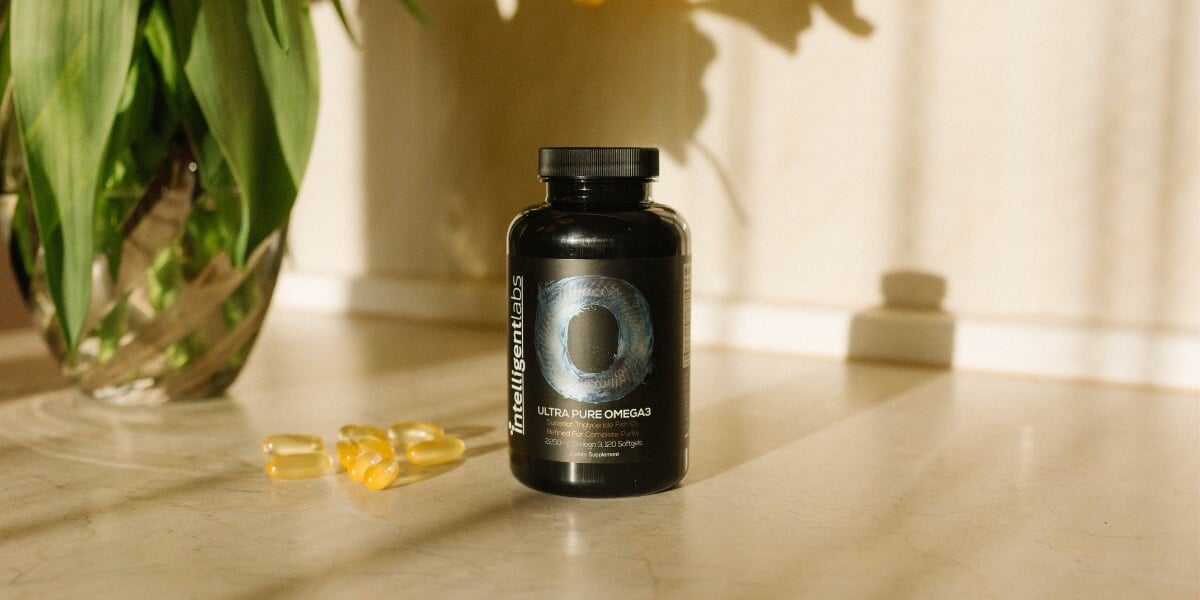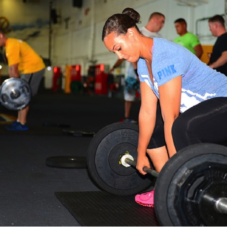Fitness
Fish Oil for Working Out: Does Omega-3 Build Muscle and Burn Fat?
Are you ready to take your workouts to the next level? Imagine crushing your training sessions, recovering faster, and even burning more fat – all with one simple addition to your routine. Enter our Ultra Pure Omega-3 Fish Oil supplement.
But how exactly can a premium quality fish oil help with your fitness goals? Well, keep reading to discover the science-backed reasons why omega-3 is a must-have for your workouts!
Table of Contents
How Does Omega-3 Fish Oil Help with Exercise?
Taking Omega-3 for sports performance and recovery is a great idea! Let’s start with the first benefit of taking fish oil for working out.
Benefit #1: Omega-3 fish oil may help reduce cortisol levels
Ever felt exhausted even after a great workout? That could be cortisol, a stress hormone that spikes after intense exercise. While some cortisol is normal, too much of it can work against your gains by slowing muscle growth and increasing fat storage.
The good news? Omega-3 fish oil may help keep cortisol levels in check. In one study, participants who supplemented with omega-3 for six weeks had lower cortisol levels, less body fat, and more lean muscle.1
On top of that, omega-3 supports muscle repair by stimulating muscle protein synthesis. Exercise creates tiny tears in your muscles, but omega-3 helps your body heal faster, making it easier to recover and grow stronger.2 Moreover, Omega-3 may even help prevent and treat sarcopenia, a condition marked by muscle loss and weakness due to aging.3
Benefit #2: Omega-3 may help with DOMS post-workout
If you’ve ever struggled to walk after leg day, you’ve experienced delayed onset muscle soreness (DOMS). This happens when exercise creates inflammation and tiny tears in your muscles, leading to stiffness and pain.
Omega-3 is a natural inflammation fighter. Research shows it can reduce muscle soreness, improve range of motion, and speed up recovery.4 In one study, participants who took 3,000 mg of omega-3 daily reported less pain and inflammation after their workouts.5
Another study on 24 overweight, untrained males found that 4 weeks of 4g fish oil reduced muscle damage, calf pain, and inflammation after cycling HIIT (high-intensity interval training).6
Essentially, these findings suggest that omega-3 is a top pick among supplements for muscle fatigue and soreness!
Benefit #3: Omega-3 may increase muscle mass and strength

Omega-3 plays a direct role in helping your muscles grow bigger and stronger. Research shows omega-3 activates the mTOR signaling pathway – the key mechanism that tells your body to build muscle.7 8
In other words, omega-3 supports protein synthesis, which is essential for muscle growth.1 2 8 9
Our in-house scientist, Dr. Vijayanand Pujari, explains:
Omega-3 supplementation supports muscle health. Taking doses above 2 grams daily for at least 6 months can boost muscle mass by about 0.67 kg and enhance mobility, including improved walking speed. These are important omega-3 benefits for fighting age-related muscle loss.10
By improving muscle function and reducing exercise-induced soreness, omega-3 helps you get the most out of your workouts and nutrition, maximizing your performance.
Benefit #4: Omega-3 may prevent muscle breakdown
Your muscles are always in a state of repair, breaking down and rebuilding as you train. But too much muscle breakdown (also known as catabolism) can slow progress.
Omega-3 helps by reducing muscle-wasting hormones and down-regulating the ubiquitin proteasome pathway – a process linked to muscle loss.11 12 13 14
It also lowers levels of stress hormones like cortisol, adrenaline, and noradrenaline, which can contribute to muscle breakdown.15 By keeping these in check, omega-3 protects your hard-earned muscle and keeps you in an anabolic (muscle-building) state.
Benefit #5: Omega-3 may help improve blood flow and stamina
Ever feel like you hit a wall during workouts? Fatigue happens when your muscles don’t get enough oxygen and nutrients. Omega-3 helps keep your blood flowing so you can train harder for longer.
Here’s how:
- It widens your blood vessels. Omega-3 improves artery function, helping blood flow more easily.16 This means more oxygen reaches your muscles, delaying fatigue.
- It balances inflammation. Too much omega-6 and not enough omega-3 can lead to chronic inflammation. Supplementing with omega-3 helps restore balance, improving circulation and endurance.17 18 19
- It improves red blood cell flexibility. Stiff red blood cells can slow down oxygen delivery. Omega-3 keeps them flexible, ensuring they can squeeze through tiny capillaries and fuel your muscles properly.20 21 22
The result? Better endurance, faster recovery, and stronger workouts.
Benefit #6: Fish oil may promote fat loss
Fish oil can boost fat burning and reduce body fat, even without changes in diet or exercise. One study showed that young men who took 6 grams of fish oil daily saw noticeable weight loss and better insulin control.23
Dr. Pujari adds:
In another study, participants taking omega-3 supplements (1020 mg/day: 580 mg EPA, 390 mg DHA) had significantly greater abdominal fat loss and reductions in overall fat mass compared to controls.24
Another study found women with type 2 diabetes lost an average of 3.5 lbs (1.6 kg) after two months of supplementing with 3 grams of fish oil daily. They also saw improved cholesterol levels – lower triglycerides and increased HDL (good cholesterol).25
Fish oil might even help you build muscle while burning fat. A 6-week study reported participants lost about 1.1 lbs (0.5 kg) of fat and gained the same amount in muscle, without changing their lifestyle.1

How Should I Start Using Fish Oil for Working Out?
Ready to experience the amazing benefits of omega-3?
Start with 3 softgels daily of our Ultra Pure Omega-3 fish oil. Each serving delivers 2,250 mg of high-quality triglyceride-form (TG) fish oil, which provides 1,224 mg of EPA (Eicosapentaenoic Acid) as TG and 816 mg of DHA (Docosahexaenoic Acid) as TG.
TG is a superior form compared to the cheaper ethyl ester alternatives. It’s purified to remove contaminants and third-party tested for quality and peace of mind.
Consistency is key. Give it 10 to 12 weeks to see the full effects. And remember, fish oil works best when paired with a solid training plan, a balanced diet, and proper recovery.
Related article: Get To Know The Different Types of Omega-3 Fatty Acids
When Should You Take a Rest Day?
Overtraining can lead to injuries, muscle fatigue, emotional instability, and even insomnia. While exercise has countless benefits, pushing too hard without enough recovery can stall progress, weaken performance, and slow muscle growth.
For muscle building, take at least one rest day every three days to allow muscles to repair and grow. Overtraining without enough rest can lead to plateaus.
For endurance training, rest days can be less frequent and may include active recovery, e.g. light workouts that promote circulation without adding strain.
Conclusion
Omega-3 fish oil supplements aren’t just for recovery. They can help build muscle, burn fat, and boost endurance when paired with proper training and rest. Stay consistent, fuel your body right, and give omega-3 time to work!
💬 Have you tried fish oil for working out? Drop a comment below and let us know your experience!
📩 Want exclusive deals and health tips? Sign up for our newsletter and enjoy 10% off your first order!
References:
- Noreen, Eric E et al. “Effects of supplemental fish oil on resting metabolic rate, body composition, and salivary cortisol in healthy adults.” Journal of the International Society of Sports Nutrition vol. 7 31. 8 Oct. 2010, doi:10.1186/1550-2783-7-31 ↩︎
- Smith, Gordon I et al. “Omega-3 polyunsaturated fatty acids augment the muscle protein anabolic response to hyperinsulinaemia-hyperaminoacidaemia in healthy young and middle-aged men and women.” Clinical science (London, England : 1979) vol. 121,6 (2011): 267-78. doi:10.1042/CS20100597 ↩︎
- Smith, Gordon I et al. “Dietary omega-3 fatty acid supplementation increases the rate of muscle protein synthesis in older adults: a randomized controlled trial.” The American journal of clinical nutrition vol. 93,2 (2011): 402-12. doi:10.3945/ajcn.110.005611 ↩︎
- Tartibian, Bakhtiar et al. “The effects of ingestion of omega-3 fatty acids on perceived pain and external symptoms of delayed onset muscle soreness in untrained men.” Clinical journal of sport medicine : official journal of the Canadian Academy of Sport Medicine vol. 19,2 (2009): 115-9. doi:10.1097/JSM.0b013e31819b51b3 ↩︎
- Jouris, Kelly B et al. “The Effect of Omega-3 Fatty Acid Supplementation on the Inflammatory Response to eccentric strength exercise.” Journal of sports science & medicine vol. 10,3 432-8. 1 Sep. 2011 ↩︎
- Makaje, Niromlee et al. “Effects of Omega-3 Supplementation on the Delayed Onset Muscle Soreness after Cycling High Intensity Interval Training in Overweight or Obese Males.” Journal of sports science & medicine vol. 23,2 317-325. 1 Jun. 2024, doi:10.52082/jssm.2024.317 ↩︎
- Dupont, Jolan et al. “The role of omega-3 in the prevention and treatment of sarcopenia.” Aging clinical and experimental research vol. 31,6 (2019): 825-836. doi:10.1007/s40520-019-01146-1 ↩︎
- Smith, Gordon I. “The Effects of Dietary Omega-3s on Muscle Composition and Quality in Older Adults.” Current nutrition reports vol. 5,2 (2016): 99-105. doi:10.1007/s13668-016-0161-y ↩︎
- Di Girolamo, Filippo Giorgio et al. “Omega-3 fatty acids and protein metabolism: enhancement of anabolic interventions for sarcopenia.” Current opinion in clinical nutrition and metabolic care vol. 17,2 (2014): 145-50. doi:10.1097/MCO.0000000000000032 ↩︎
- Huang, Ya-Hui et al. “Effects of Omega-3 Fatty Acids on Muscle Mass, Muscle Strength and Muscle Performance among the Elderly: A Meta-Analysis.” Nutrients vol. 12,12 3739. 4 Dec. 2020, doi:10.3390/nu12123739 ↩︎
- Whitehouse, A S et al. “Mechanism of attenuation of skeletal muscle protein catabolism in cancer cachexia by eicosapentaenoic acid.” Cancer research vol. 61,9 (2001): 3604-9. ↩︎
- Whitehouse, A S, and M J Tisdale. “Downregulation of ubiquitin-dependent proteolysis by eicosapentaenoic acid in acute starvation.” Biochemical and biophysical research communications vol. 285,3 (2001): 598-602. doi:10.1006/bbrc.2001.5209 ↩︎
- Ross, J A et al. “The anti-catabolic effects of n-3 fatty acids.” Current opinion in clinical nutrition and metabolic care vol. 2,3 (1999): 219-26. doi:10.1097/00075197-199905000-00005 ↩︎
- Smith, Helen J et al. “Downregulation of ubiquitin-dependent protein degradation in murine myotubes during hyperthermia by eicosapentaenoic acid.” Biochemical and biophysical research communications vol. 332,1 (2005): 83-8. doi:10.1016/j.bbrc.2005.04.097 ↩︎
- Delarue, J et al. “Fish oil prevents the adrenal activation elicited by mental stress in healthy men.” Diabetes & metabolism vol. 29,3 (2003): 289-95. doi:10.1016/s1262-3636(07)70039-3 ↩︎
- Hill, Alison M et al. “Combining fish-oil supplements with regular aerobic exercise improves body composition and cardiovascular disease risk factors.” The American journal of clinical nutrition vol. 85,5 (2007): 1267-74. doi:10.1093/ajcn/85.5.1267 ↩︎
- Hu, Frank B et al. “Fish and omega-3 fatty acid intake and risk of coronary heart disease in women.” JAMA vol. 287,14 (2002): 1815-21. doi:10.1001/jama.287.14.1815 ↩︎
- Trebble, Timothy M et al. “Prostaglandin E2 production and T cell function after fish-oil supplementation: response to antioxidant cosupplementation.” The American journal of clinical nutrition vol. 78,3 (2003): 376-82. doi:10.1093/ajcn/78.3.376 ↩︎
- Robinson, Jennifer G, and Neil J Stone. “Antiatherosclerotic and antithrombotic effects of omega-3 fatty acids.” The American journal of cardiology vol. 98,4A (2006): 39i-49i. doi:10.1016/j.amjcard.2005.12.026 ↩︎
- Galea, G, and R J Davidson. “Hemorrheology of marathon running.” International journal of sports medicine vol. 6,3 (1985): 136-8. doi:10.1055/s-2008-1025826 ↩︎
- Seyed Majid Hosseini, and James J Feng. “A Particle-Based Model for the Transport of Erythrocytes in Capillaries.” Chemical Engineering Science, vol. 64, no. 22, 1 Nov. 2009, pp. 4488–4497, https://doi.org/10.1016/j.ces.2008.11.028. ↩︎
- Cartwright, I J et al. “The effects of dietary omega-3 polyunsaturated fatty acids on erythrocyte membrane phospholipids, erythrocyte deformability and blood viscosity in healthy volunteers.” Atherosclerosis vol. 55,3 (1985): 267-81. doi:10.1016/0021-9150(85)90106-6 ↩︎
- Couet, C., et al. “Effect of Dietary Fish Oil on Body Fat Mass and Basal Fat Oxidation in Healthy Adults.” International Journal of Obesity and Related Metabolic Disorders: Journal of the International Association for the Study of Obesity, vol. 21, no. 8, 1 Aug. 1997, pp. 637–643, pubmed.ncbi.nlm.nih.gov/15481762/ ↩︎
- Salman, Havva Banu et al. “The effect of omega-3 fatty acid supplementation on weight loss and cognitive function in overweight or obese individuals on weight-loss diet.” “El efecto de la suplementación con ácidos grasos omega-3 sobre la pérdida de peso y las funciones cognitivas en personas con sobrepeso u obesidad en dieta para adelgazar.” Nutricion hospitalaria vol. 39,4 (2022): 803-813. doi:10.20960/nh.03992 ↩︎
- Kabir, Morvarid et al. “Treatment for 2 mo with n 3 polyunsaturated fatty acids reduces adiposity and some atherogenic factors but does not improve insulin sensitivity in women with type 2 diabetes: a randomized controlled study.” The American journal of clinical nutrition vol. 86,6 (2007): 1670-9. doi:10.1093/ajcn/86.5.1670 ↩︎





